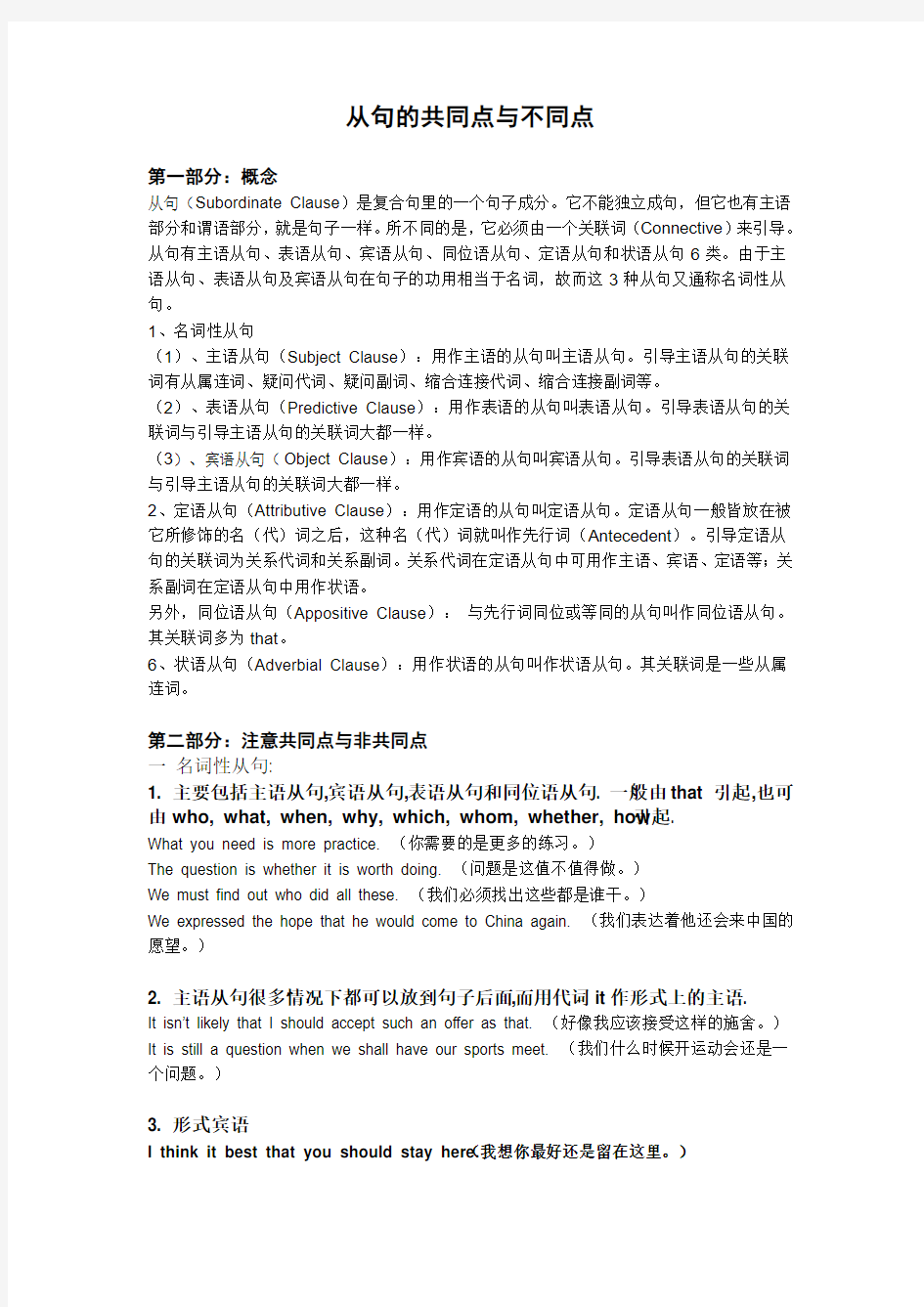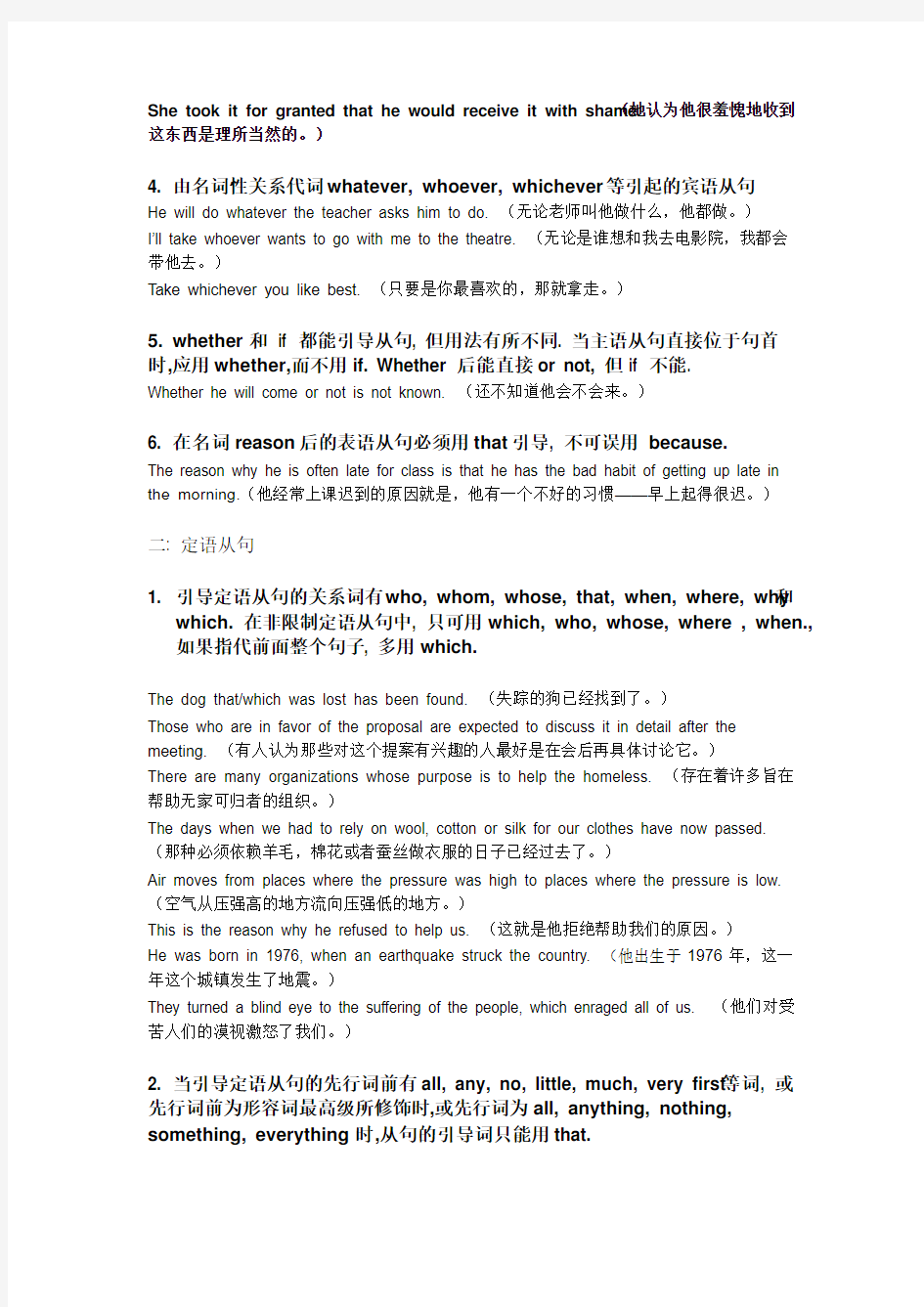

从句的共同点与不同点
第一部分:概念
从句(Subordinate Clause)是复合句里的一个句子成分。它不能独立成句,但它也有主语部分和谓语部分,就是句子一样。所不同的是,它必须由一个关联词(Connective)来引导。从句有主语从句、表语从句、宾语从句、同位语从句、定语从句和状语从句6类。由于主语从句、表语从句及宾语从句在句子的功用相当于名词,故而这3种从句又通称名词性从句。
1、名词性从句
(1)、主语从句(Subject Clause):用作主语的从句叫主语从句。引导主语从句的关联词有从属连词、疑问代词、疑问副词、缩合连接代词、缩合连接副词等。
(2)、表语从句(Predictive Clause):用作表语的从句叫表语从句。引导表语从句的关联词与引导主语从句的关联词大都一样。
(3)、宾语从句(Object Clause):用作宾语的从句叫宾语从句。引导表语从句的关联词与引导主语从句的关联词大都一样。
2、定语从句(Attributive Clause):用作定语的从句叫定语从句。定语从句一般皆放在被它所修饰的名(代)词之后,这种名(代)词就叫作先行词(Antecedent)。引导定语从句的关联词为关系代词和关系副词。关系代词在定语从句中可用作主语、宾语、定语等;关系副词在定语从句中用作状语。
另外,同位语从句(Appositive Clause):与先行词同位或等同的从句叫作同位语从句。其关联词多为that。
6、状语从句(Adverbial Clause):用作状语的从句叫作状语从句。其关联词是一些从属连词。
第二部分:注意共同点与非共同点
一名词性从句:
1. 主要包括主语从句,宾语从句,表语从句和同位语从句. 一般由that 引起,也可由who, what, when, why, which, whom, whether, how 引起.
What you need is more practice. (你需要的是更多的练习。)
The question is whether it is worth doing. (问题是这值不值得做。)
We must find out who did all these. (我们必须找出这些都是谁干。)
We expressed the hope that he would come to China again. (我们表达着他还会来中国的愿望。)
2. 主语从句很多情况下都可以放到句子后面,而用代词it作形式上的主语.
It isn’t likely that I should accept such an offer as that. (好像我应该接受这样的施舍。)It is still a question when we shall have our sports meet. (我们什么时候开运动会还是一个问题。)
3. 形式宾语
I think it best that you should stay here. (我想你最好还是留在这里。)
She took it for granted that he would receive it with shame. (她认为他很羞愧地收到这东西是理所当然的。)
4. 由名词性关系代词whatever, whoever, whichever 等引起的宾语从句
He will do whatever the teacher asks him to do. (无论老师叫他做什么,他都做。)
I’ll take whoever wants to go with me to the th eatre. (无论是谁想和我去电影院,我都会带他去。)
Take whichever you like best. (只要是你最喜欢的,那就拿走。)
5. whether 和if 都能引导从句, 但用法有所不同. 当主语从句直接位于句首时,应用whether,而不用if. Whether 后能直接or not, 但if 不能.
Whether he will come or not is not known. (还不知道他会不会来。)
6. 在名词reason后的表语从句必须用that引导, 不可误用because.
The reason why he is often late for class is that he has the bad habit of getting up late in the morning.(他经常上课迟到的原因就是,他有一个不好的习惯——早上起得很迟。)
二: 定语从句
1. 引导定语从句的关系词有who, whom, whose, that, when, where, why 和
which. 在非限制定语从句中, 只可用which, who, whose, where , when., 如果指代前面整个句子, 多用which.
The dog that/which was lost has been found. (失踪的狗已经找到了。)
Those who are in favor of the proposal are expected to discuss it in detail after the meeting. (有人认为那些对这个提案有兴趣的人最好是在会后再具体讨论它。)
There are many organizations whose purpose is to help the homeless. (存在着许多旨在帮助无家可归者的组织。)
The days when we had to rely on wool, cotton or silk for our clothes have now passed. (那种必须依赖羊毛,棉花或者蚕丝做衣服的日子已经过去了。)
Air moves from places where the pressure was high to places where the pressure is low. (空气从压强高的地方流向压强低的地方。)
This is the reason why he refused to help us. (这就是他拒绝帮助我们的原因。)
He was born in 1976, when an earthquake struck the country. (他出生于1976年,这一年这个城镇发生了地震。)
They turned a blind eye to the suffering of the people, which enraged all of us. (他们对受苦人们的漠视激怒了我们。)
2. 当引导定语从句的先行词前有all, any, no, little, much, very first 等词, 或先行词前为形容词最高级所修饰时,或先行词为all, anything, nothing, something, everything 时,从句的引导词只能用that.
The only thing that matters to the children is how soon they can have their holiday. (孩子们唯一关心的是他们什么时候放假。)
These are the very points that puzzle me. (真正困扰我的是这些观点。)
Is there anything that bothers you? (有什么事烦着你吗?)
This is the best film that was ever produced by the company. (这部是那个公司有史以来拍摄得最好的电影。)
3. as 可做引导词引导定语从句, 多和such, the same 连用. As 引导的定语
从句也可修饰整个句子, 既可放在先行词后,也可放在句子开头.
Such people as you describe are rare nowadays.(你描述的那一类人现在很少了。)
The boy was run over by a motor-car, as often happened in pre-liberation Shanghai.(那个男孩被一辆摩托轧过去了,这种事在解放前的上海是不少见的。)
As is often the case, the girl forgot to bring her dictionary.(正如往常一样,这个女孩又忘了带上字典。)
We are opposed to such ideas as are not based upon objective facts.(我们是反对这种毫无事实根据的想法的。)
4. 介词+which/whom/whose从句
The driver is the man from whose room she had stolen the gold watch.(她就是从那个司机的房间偷了金表的。)
Language is a tool by means of which people communicate ideas with each other.(语言就是人们用来和其他人交流的一种工具。)
Jane spent all evening talking about her latest book, of which none of us had ever heard.(Jane一晚上都在谈论着也最近学课本,那些内容我们闻所未闻。)
5. 代/名+介词+which 从句
He needs a book, the name of which I don't know.(他需要一本书,但是我不知道书名。)In factories and in our daily life, there are many waste materials, all of which can he turned into useful things under certain condition.(在工厂里,在我们的日常生活中都有很多垃圾,其实这些垃圾在某种情况下是可以转变为有用的东西的。)
To make an objective test the teacher writes a series of questions, each of which has only one correct answer.(为了能够客观地测试,老师写了一串答案唯一的问题。)
6. 同位语从句和定语从句
The news that he has been admitted by Harvard University is very pleasing.(他被哈佛大学录取的消息非常令人兴奋。)
The news that you told me was really exciting.(你告诉我的好个消息真的是很激动人心。)三状语从句: 修饰主句中的动词, 形容词和副词, 通常有从属连词引导, 按其
意义和作用可分为时间, 地点, 条件, 原因, 让步, 目的, 结果, 方式, 比较.等
1. 时间状语从句:
1) 常见连词有after, as, before, once, since, till, (not)until, when, whenever(no matter when), while, as long as, as soon as etc.
As you look at yourself in a mirror, you’ll seen an identical image of yourself.
It is a long time before it is possible to test the medicine on human patients.
It was not until…that
Not until…did he…
Not until I received the letter, did I know he had gone to America.
It was not until….
When I got to the airport, I suddenly remembered that I had left the ticket behind.
I was about to leave, when something occurred which attracted my attention. Whenever we have difficulty, he’ll come to help us.
2) no sooner…than, hardly(scarcely, barely)…when: 刚做…就….
No sooner had I opened the door than the telephone rang.
She had scarcely news when she fainted.
3) 还有immediately, directly, instantly, the moment, the minute, the instant, the second, every time etc
I’ll tell you about it the moment you come.
I got in touch with him immediately I received his letter.
2. 地点状语从句: 一般用where or wherever 引导
I will stand where I can see the parade clearly.
Wherever they went, they were warmly welcome.
3. 条件状语从句:真实条件从句:if, unless, so long as, provided that, supposing that, on condition that, in the event that, in case that etc
I will not go to her party if she doesn’t invite me.
I will not go to her party unless she invites me.
4. 原因状语从句: 从属连词有because, as ,since, for, now, that, in that, seeing that, considering that(鉴于,由于)
As the school regulations are written quite clearly, there is nothing more to be explained. Considering that the sweater was hard made, it was not expensive.
Seeing that they are inexperienced, they are doing quite a good job.
5. 让步状语从句:
1): even if, though, even though, while(尽管) no matter what/how/which, however, whatever, whichever, however etc.
He will not give up smoking even though the doctor advises him to.
Whatever the consequence may be, I will be on your side.
However hard she tried to explain, nobody trusted her.
It has been the same result, whichever way you do it.
2) 由as 引起的让步从句, 语气较强烈,被强调的词须放在句首.
Simple as the question may seem, it is not at all common in nature.
Cold as it is, the children play outdoors.
Much as I respect him, I can’t agree with him.
Object as you may, I will go on with my plan.
3) whether…or,不管…或…
Whether you are a student or a teacher, you are required to obey the regulations of the school.
6. 结果状语从句: so that, so…that, such…that
He is so humorous that we’ll never forget him.
She is such a nice girl that everybody likes to make friends with her.
7. 目的状语从句: so that, in order that, for fear that, lest, in case
I checked all the results time and again for fear that there should be any mistakes. Telephone us in advance in order that we might make the necessary arragements.
8. 方式状语从句: as, just as, as if: 如同…一样
we should do the exercise as our teacher tells us.
You talk as if you had really been there.
It looks as if it is going to rain.
Nails protect the ends of human fingers and toes as claw protect the toes of most animals. The young man operates the machine as the old worker has taught him.
9. 比较状语从句:
1) as…as(肯定句), not so/as…as(否定句)
the film was not so exciting as we expected.
The history of nursing is as old as the history of man.
She likes them almost as much as Paul does.
2) 比较级+than, so much/a lot more than
She looks much younger than she is.
The universe is a lot more complicated than you think.
3) no more/er…than, not more/er…than, less…than
Jack is no more frightened than Mike is.杰克和迈克一样那么害怕。
Jack is not more frightened than Mike is. 杰克不像迈克一样那么害怕
Tom is no more rich than Black.汤姆和布莱克一样很穷。
Tom is not more rich than Black.汤姆不比布莱克富裕。
即,no后所带的形容词与所表达的意思正好相反
no rich than=as poor as
no later than=as early as
no bigger than=as small as
又例如:
I have not taken more than six courses this semester.选了不足六门课程I have taken no more than six course this semester.仅选了六门课程
注意:
no more ···than (=not ···any more than)
Sth和sth一样不是···
The whale is no more a fish than a horse is.
鲸和马同样不是鱼。即鲸不是鱼,如同马不是鱼一样。
4) the more…the more
The farther north you go, the severer the winter is.
The more I see of him, the less I like him.